Central Valley Health Policy Institute
CVHPI Presentations
Highlights
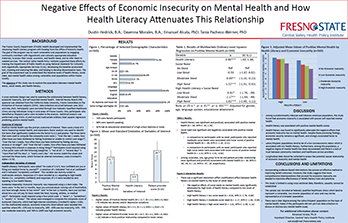
Presenters: Emanuel Alcala, PhD, Dustin Hedrick, B.A., Davenna Morales, B.A., Tania Pacheco-Werner, PhD
American Public Health Association 2024
October 28, 2024
Residents of West Fresno County face health disparities that were exacerbated following the COVID-19 pandemic. CHWs recruited participants from underserved rural communities. Baseline data collected during screening included questions about economic instability, mental health, and health literacy levels. After screening, they received health education materials and referrals. This study highlights an intersectional relationship between health literacy, economic instability, and mental health.
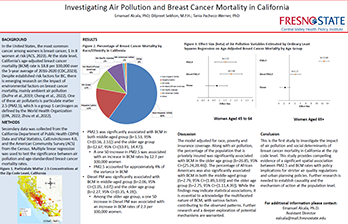
Investigating Air Pollution and Breast Cancer Mortality in California
Presenter: Emanuel Alcala, PhD; Dilpreet Sekhon, M.P.H., Tania Pacheco-Werner, PhD
American Public Health Association 2024
October 27, 2024
California’s age-adjusted breast cancer mortality (BCM) rate is 18.8 per 100,000 from 2016-2020. Despite established risk factors for BC, there is emerging research on the impact of environmental factors on breast cancer mortality. The objective of the research was to investigate the place-based association between BCM in middle-aged (45-64) and older-age women (65+) and air pollution in California at the zip code level while controlling for sociodemographic factors.
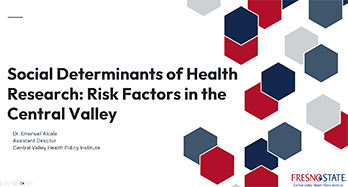
Social Determinants of Health Research: Risk Factors in the Central Valley
Presenter: Dr. Emanuel Alcala, PhD
CHHS Brown Bag Lecture Series
April 26, 2024
As part of the CHHS Brown Bag Lecture Series Research Workshop of Spring 2024, Dr. Emanuel Alcala walks us through major place-based risk factors in California's Central Valley. He presents an analysis of environmental degradation, socioeconomic disadvantage, and asthma-related emergency department visits using data from the Health Care Access and Information (HCAI) and the CalEnviroScreen 4.0.
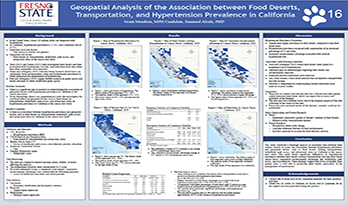
Geospatial Analysis of the Association between Food Deserts, Transportation, and Hypertension
Prevalence in California
Presenter: Grant Mendoza, MPH, Emanuel Alcala, PhD
45th Annual Central California Research Symposium
April 3, 2024
This study aimed to understand the geospatial association between food deserts, transportation, and hypertension prevalence in California at the census tract level. Findings revealed that communities in food deserts without adequate transportation were at a significantly higher risk of hypertension, highlighting the importance of addressing both food access and transportation infrastructure to mitigate hypertension prevalence.
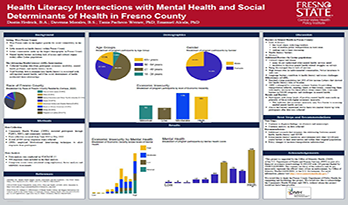
Health Literacy Intersections with Mental Health and Social Determinants of Health
in Fresno County
Presenter: Dustin Hedrick, BA, Davenna Morales, BA, Tania Pacheco Werner, PhD, Emanuel
Alcala, PhD
45th Annual Central California Research Symposium
April 3, 2024
The Advancing Health Literacy (AHL) project aimed to assess and improve health literacy in western Fresno County through community health worker (CHW) outreach and education. This presentation focuses on the interactions between economic stability and mental health, and the systemic barriers impeding access to needed services.
Past Presentations
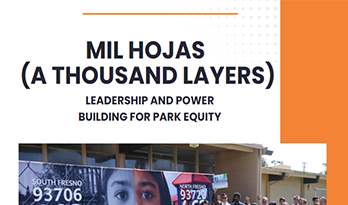
Mil Hojas (A Thousand Layers): Leadership and Power Building for Park Equity
Presenters: Ana Rubio, BA, Atziri Barboza, BS, Armando Ramirez, BA
Decade of Powerbuilidng Series
November 30, 2023
Through resident and youth outreach, the Fresno BHC Coalition helped to lead Fresno’s park equity efforts through the #Parks4All campaign and securing the realization and implementation of Measure P, a tax measure to fund Fresno parks. This presentation highlights how residents emerged as leaders in ushering in a historic change to how the City prioritizes park and greenspace equity in Fresno.
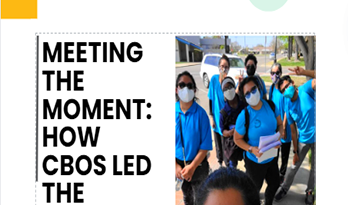
Meeting the Moment: How CBOs Led the COVID-19 Response in Fresno County
Presenters: Guadalupe Corona-Gomez, BS, Miguel Garcia-Raya, BS
Decade of Powerbuilidng Series
November 16, 2023
This case study focuses on three health equity leaders who have been involved with Fresno Building Healthy Communities (Fresno BHC) Coalition in Fresno county and who helped develop the Immigrant and Refugee Coalition’s (IRC) COVID-19 Equity Project (CEP) and the efforts of their coalition in developing and obtaining funding and support for an equity-based community health worker (CHW) model.
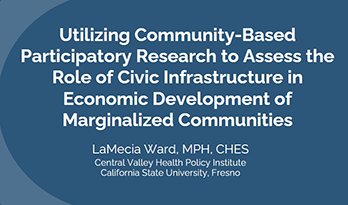
Utilizing Community-Based Participatory Research to Assess the Role of Civic Infrastructure
in Economic Development of Marginalized Communities
Presenter: LaMecia Ward, MPH, CHES
American Public Health Association 2023
November 15, 2023
The Fresno Developing the Regions Inclusive Vibrant Economy (DRIVE) Initiative aims to directly address factors contributing to economic and racial inequity by building local power through a civic infrastructure (CI) network. The CI network includes community-based organizations (CBOs) and nine resident-led hyper-localized hubs. A community-based participatory approach was used to develop and implement an assessment of resident priorities and readiness to engage in civic work.
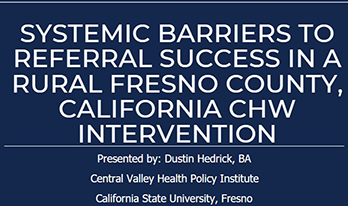
Systemic Barriers to Referral Success in a Rural Fresno County, California CHW Intervention
Presenter: Dustin Hedrick, BA
American Public Health Association 2023
November 15, 2023
The Advancing Health Literacy (AHL) project is an initiative focused on improving health disparities in rural West Fresno County. CHWs duties included administering needs assessments and subsequent referrals to clients in the intervention. The evaluation team ran statistical analysis on quantitative data on patients (n=535) from a community health record. Key informant interviews (n=27) of CHWs and their supervisors offered further details of the client experience.
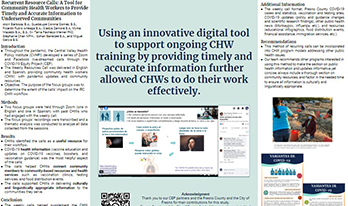
Recurrent Resource Calls: A Tool for Community Health Workers to Provide Timely and
Accurate Information to Underserved Communities
Presenter: Atziri Barboza, BS
American Public Health Association 2023
November 14, 2023
Throughout the pandemic, the Central Valley Health Policy Institute (CVHPI) developed a series of Zoom and Facebook live-streamed calls through the COVID-19 Equity Project (CEP). The Weekly Resources Call was delivered in English and Spanish, providing community health workers (CHWs) with pandemic updates and community resources. The call was an integral part of the pandemic response and was a tool to strengthen the capacity of the CHWs to serve vulnerable communities in Fresno County.
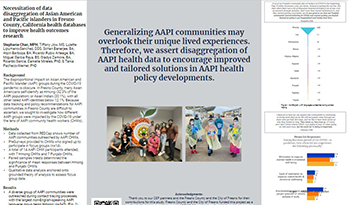
Necessitation of data disaggregation of Asian American and Pacific islanders in fresno
county, California health databases to improve health outcomes research
Presenter: Stephanie Chan, MPH
American Public Health Association 2023
November 14, 2023
The disproportional impact on Asian American and Pacific Islander (AAPI) groups during the COVID-19 pandemic is obscure. The pandemic response for the AAPI community health workers (CHWs), although their experiences also remain unknown. Our investigation on Hmong and Punjabi community health workers (CHWs) highlighted the importance of AAPI data disaggregation for public health analyses in Fresno County, California.
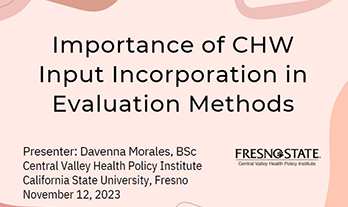
Importance of CHW Input Incorporation in Evaluation Methods
Presenter: Davenna Morales, BS
American Public Health Association 2023
November 12, 2023
The Advancing Health Literacy Initiative in West Fresno County focused on improving health disparities by employing CHWs to administer health needs assessments and referrals to clients. When data analysis revealed low referral rates, the evaluation team at CVHPI conducted interviews with CHWs. These interviews revealed that lack of access, client mistrust, misunderstanding, and CHW burnout were all contributing factors.
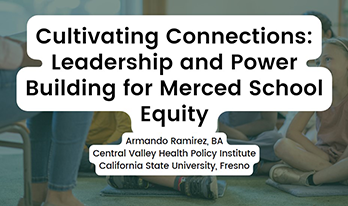
Cultivating Connections: Leadership and Power Building for Merced School Equity
Presenter: Armando Ramirez, BA
American Public Health Association 2023
November 12, 2023
Over the last decade, Building Healthy Communities (BHC) Merced’s School Action Team (SAT) fought to increase budget transparency and parental civic engagement to improve school climate. Monolingual school budget documents and other factors left to vulnerable communities without a voice . Key informant inteviews were conducted to learn more about Building Healthy Communities (BHC) Merced’s School Action Team (SAT) work.
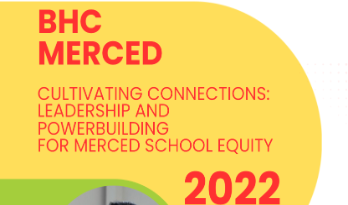
Cultivating Connections: Leadership and Power Building for Merced School Equity
Presenters: Guadalupe Corona-Gomez, BS, Ana Rubio, BA
Decade of Powerbuilidng Series
November 9, 2023
Over the past decade, Building Healthy Communities (BHC) Merced efforts included providing a platform for residents and youth to make a difference in local schools. This case study focuses on the school advocacy and community organizing work that increased equity in Merced schools for students and parents through the development of people power and power building.
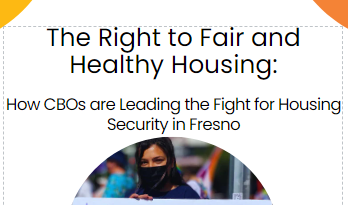
The Right to Fair and Healthy Housing: How CBOs are Leading the Fight for Housing
Security in Fresno
Presenters: Guadalupe Corona-Gomez, BS, Ana Rubio, BA, Armando Ramirez, BA
Decade of Powerbuilidng Series
November 2, 2023
Through power building in Fresno around affordable housing and housing-related policies, Fresno BHC has amplified adult and youth residents’ voices, working to increase community inclusion in decision-making at public and private levels.
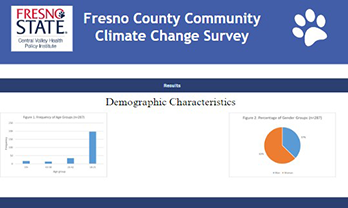
Fresno County Community Climate Change Survey
Presenters: Emanuel Alcala, PhD, Dustin Hedrick BA, Armando Ramirez, BA, Josian Zuniga,
BS
44th Annual Central California Research Symposium
April 3, 2023
The effects of climate change have been shown to negatively impact the San Joaquin Valley. Thus, it is important to understand the overall knowledge, beliefs, and opinions on climate change of Fresno County to inform policymakers. The objective of this study was to understand the knowledge, beliefs, and opinions toward climate change that Fresno County residents hold.
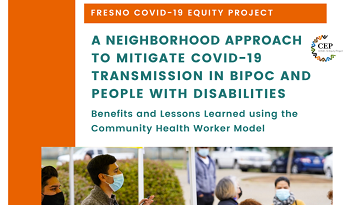
Fresno COVID-19 Equity Project: White Paper Presentation
July 7, 2021
Central Valley Health Policy Institute will present the findings, structure, and model of the COVID-19 Equity's Project White Paper Presentation. In addition, CVHPI will present how the collaborative efforts and CBO's adaptive leadership contributed to mitigating the spread of COVID-19 in our most vulnerable communities. Please click the image or the link above to access the Recording session on Facebook Live.
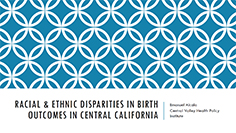
Racial & Ethnic Disparities in Birth Outcomes in Central California 2016 California
WIC Association Conference
April 2016
Contributors: Emanuel Alcala, MA
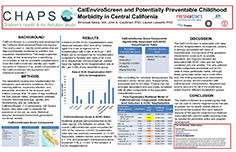
2015 NIEHS/EPA Children's Centers Annual Meeting
October 29, 2015
Contributors: Emanuel Alcala, MA; John A. Capitman, PhD; Lauren Lessard, MPH, PhD
CalEnviroScreen is a screening tool developed by the California Environmental Protection Agency. This tool is used to identify communities that are disproportionately burdened by pollution and population characteristics. This study examined the utility of this screening tool in identifying communities at risk for avoidable hospitalizations. Does the CalEnviroScreen identify poor health outcomes in children? If so, which components of the CalEnviroScreen are associated with childhood morbidity?
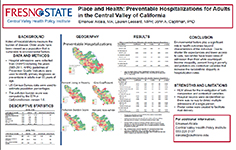
APHA 142nd Annual Meeting & Exposition
November 18, 2014
Contributors: Emanuel Alcala, MA; Lauren Lessard, MPH; John A. Capitman, PhD
Environmental factors play a significant role in health outcomes beyond characteristics of the individual. Due to shorter life expectancies and lower access to care, non-whites have lower rates of admission than their white counterpart. Income inequality, percent living in poverty, and pollution are contextual variables that increase the racial/ethnic disparity in hospitalization rates.
-
Data and Methods
-
Descriptive Statistics
-
Geography
-
Results
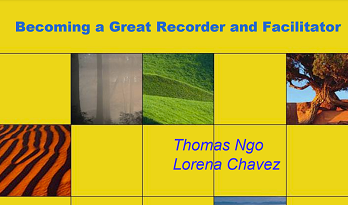
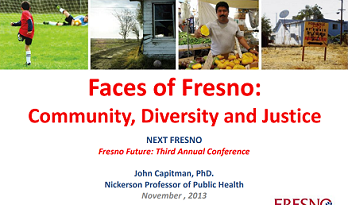
Faces of Fresno: Community, Diversity and Justice
November 1, 2013
-
A perspective on Cities, Health and Justice:
The assumption of Political Equality
Place, Equity and Public Health -
Place, Demography and Health in Fresno
-
Health and Justice Perspectives on Next Fresno:
A new narrative for Fresno
Address environmental hazards
Focus job creation around community assets
Equal access to neighborhood amenities
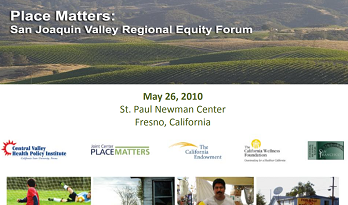
He2005alth and Well-being Disparities: San Joaquin Valley Findings
May 26, 2010
Instead of looking at the tradition model of looking at a person's age, race, gender, and ethnicity; John and his colleagues has taken a different approach in data findings. Reach show that groups of people who share geographic and associated living conditions have similar life chances. These include such factors as poor air, housing, open space, jobs, schools, and services all play out to effect the overall health of one. Ultimately this creates differences in risk people face and in their opportunities for vigorous and fulfilling lives.
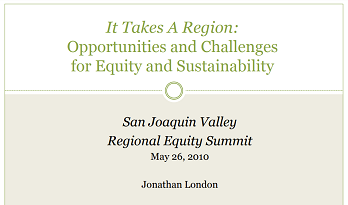
It Takes A Region: Opportunities and Challenges for Equity and Sustainability
May 26, 2010
Jonathan presented on why regions matter by looking at sweet-spot between local and state, people and problems move around regionally, regional influences on community well-being, patterns of disparity across place and population, and community solutions require regional strategies along with local strategies.
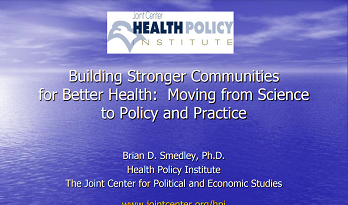
Building Stronger Communities for Better Health: Moving from Science to Policy and
Practice
May 1, 2010
Looking from a national perspective, Brian presented about the three challenges that are: health inequality will get worse as a result of economic downturn, the United States is NOT “post-racial” Ð to the extent that this perception exists and the “individual determinist” orientation remains predominant in the United States.
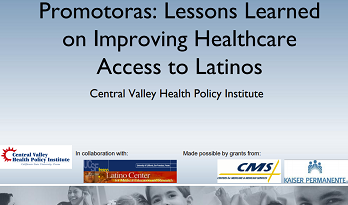
Promotoras: Lessons Learned on Improving Healthcare Access to Latinos
March 18, 2010
This webinar was a part of the Agency for Healthcare Research and Quality (AHRQ) presentation series for Ensuring Cultural Competence Across Care Settings.
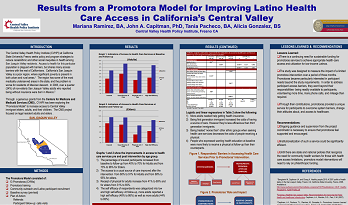
Promotora Model for Improving Latino Health Care Access in California's Central Valley
January 13, 2010
Download poster presentation (PDF).
Download the press release (PDF).
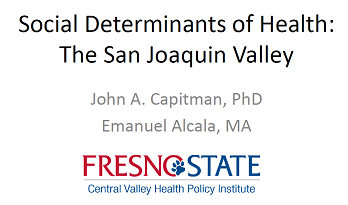
Webinar: Individual and Neighborhood Determinants of Health Inequalities in California's
Central Valley
2010
This webinar discussing the Social Determinants of Health in the San Joaquin Valley was a part of the National Collaborative for Health Equity.
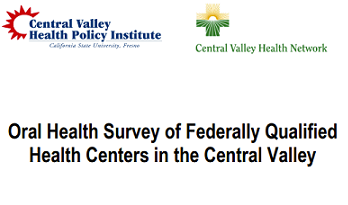
Access to Oral Health Care in Central California
March 2009
Low-income residents of the Central Valley face limited access to oral health care due to barriers, including a shortage of dental health professionals, a maldistribution of services, and a lack of providers willing to accept uninsured or publicly insured patients. Federally Qualified Health Centers (FQHCs) ease access barriers by providing oral care to underserved populations. In an effort to respond to regional concerns regarding the shortage of oral health professionals, a survey was conducted to evaluate the impact of these shortages in the Central Valley.
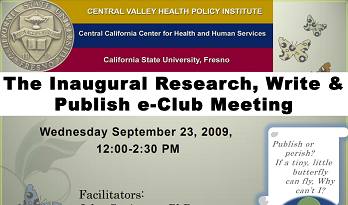
Research Write & Publish Electronic Collaboration Club (RW&P e-Club)
The Inaugural Research, Write & Publish e-Club Meeting
September 23, 2009
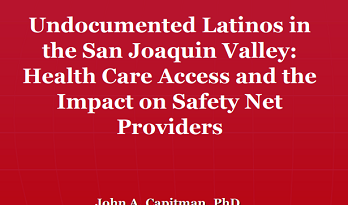
Undocumented Latinos in the San Joaquin Valley: Health Care Access and the Impact
on Safety Net Providers
August 26, 2009
The purpose of this study is to assess how safety net providers are impacted by serving undocumented Latinos and how immigrant populations are experiencing care access.